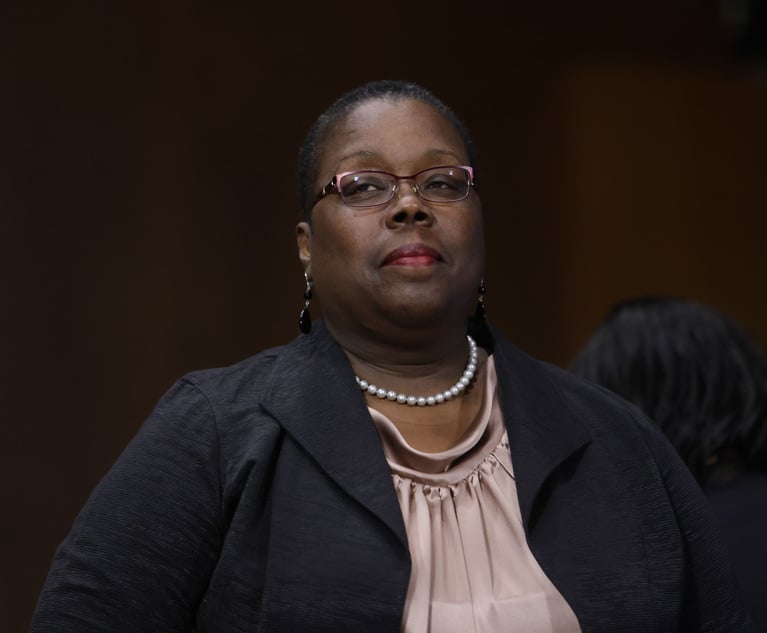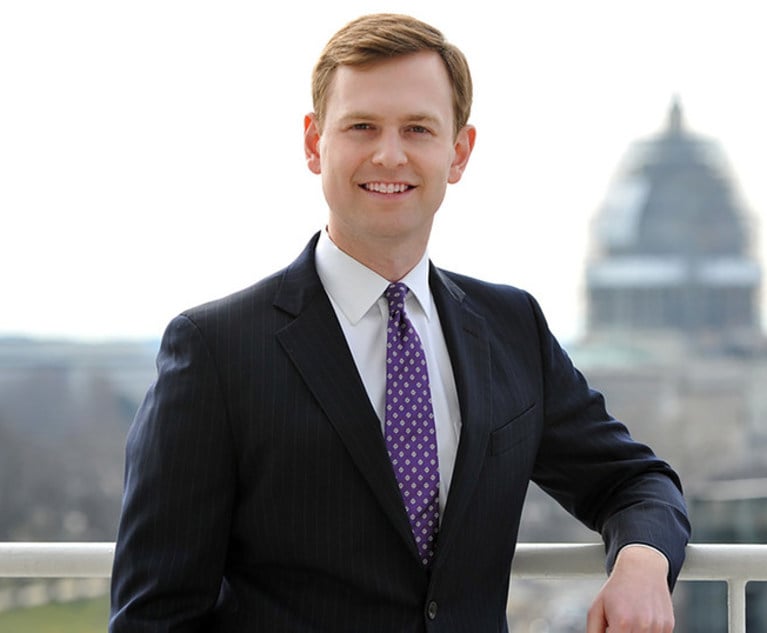 Demonstrators outside the U.S. Supreme Court in Washington, D.C., during oral arguments in the Deferred Action on Childhood Arrivals cases. Credit: Diego M. Radzinschi / ALM
Demonstrators outside the U.S. Supreme Court in Washington, D.C., during oral arguments in the Deferred Action on Childhood Arrivals cases. Credit: Diego M. Radzinschi / ALMJustices Urged to Consider Role of 'Dreamers' in Fighting Pandemic
"Termination of DACA during this national emergency would be catastrophic," lawyers for "Dreamers" told the U.S. Supreme Court on Friday in a letter.
March 27, 2020 at 04:42 PM
4 minute read
The coronavirus pandemic has become part of one of the U.S. Supreme Court's most important cases this term, potentially complicating its outcome. Whether and how the justices will be influenced by the crisis in their final deliberations is hard to gauge.
Lawyers for a group of "Dreamers," recipients of the Deferred Action on Childhood Arrivals program, informed the justices in a letter Friday that 27,000 recipients are health care workers and nearly 200 are medical students, residents and physicians, many now fighting the virus across the nation.
The Trump administration's plan to terminate the DACA program—the legality of which is now before the justices in three cases—would be "catastrophic," wrote Michael Wishnie of the Jerome N. Frank Legal Services Organization, counsel of record in the case Wolf v. Vidal. "The pandemic sheds new light on the reliance interests of healthcare providers and the public health consequences of ignoring those interests."
It's rare that the justices are asked to address issues that come up after arguments. The letter from the DACA lawyers is not the first time that new events have made their way to the justices' attention in a pending case.
Last term, lawyers challenging the placement of a citizenship question on the 2020 census informed the court after April arguments that new evidence showed the government intended the question to give a political advantage to whites and Republicans and not, as the government claimed, to enforce the Voting Rights Act. Those lawyers urged the justices to send the case back to the district court for additional proceedings.
The justices, in a 5-4 decision by Chief Justice John Roberts Jr., rejected the government's justification for the citizenship question, saying the evidence told a story that did not match the government's explanation.
The justices heard arguments in the DACA cases on Nov. 12 and likely already have taken draft votes on the outcome as well as crafted draft opinions. If the justices decide that the government acted legally in its effort to terminate the program, the Trump administration has indicated it will begin to enforce removal orders. The court's decision may affect the lives of nearly 700,000 "Dreamers," many now young adults.
Besides the loss of DACA recipients working to fight the virus, Wishnie told the justices that the pandemic reveals DACA recipients' impact on the economy and the importance of their participation in public health measures.
"Millions of family members, including U.S. citizens, rely upon DACA recipients for their economic and physical well-being," he wrote. "Furthermore, the forbearance from immigration enforcement that DACA affords promotes compliance by DACA recipients with stay-at-home orders and facilitates safe testing and treatment for COVID-19. These steps are essential to the public health measures now being taken to slow transmission of the virus and prevent the nation's healthcare system from being overwhelmed."
In his DACA letter, Wishnie urged similar action by the justices to what the census challengers sought last term: the opportunity for supplemental briefing on the scope and relevance of DACA reliance interests, including whether "in light of the extraordinary public health emergency" the issue should be sent back to the agency for reconsideration of its decision to terminate DACA.
Wishnie was joined in the letter by lawyers with the National Immigration Law Center and Make the Road New York.
This content has been archived. It is available through our partners, LexisNexis® and Bloomberg Law.
To view this content, please continue to their sites.
Not a Lexis Subscriber?
Subscribe Now
Not a Bloomberg Law Subscriber?
Subscribe Now
NOT FOR REPRINT
© 2024 ALM Global, LLC, All Rights Reserved. Request academic re-use from www.copyright.com. All other uses, submit a request to [email protected]. For more information visit Asset & Logo Licensing.
You Might Like
View All
Can Law Firms Avoid Landing on 'Enemy' List During the Trump Administration?
5 minute read
Meet the Pacific Northwest Judges Who Rejected the Kroger-Albertsons Supermarket Merger
4 minute read

Trending Stories
Who Got The Work
Michael G. Bongiorno, Andrew Scott Dulberg and Elizabeth E. Driscoll from Wilmer Cutler Pickering Hale and Dorr have stepped in to represent Symbotic Inc., an A.I.-enabled technology platform that focuses on increasing supply chain efficiency, and other defendants in a pending shareholder derivative lawsuit. The case, filed Oct. 2 in Massachusetts District Court by the Brown Law Firm on behalf of Stephen Austen, accuses certain officers and directors of misleading investors in regard to Symbotic's potential for margin growth by failing to disclose that the company was not equipped to timely deploy its systems or manage expenses through project delays. The case, assigned to U.S. District Judge Nathaniel M. Gorton, is 1:24-cv-12522, Austen v. Cohen et al.
Who Got The Work
Edmund Polubinski and Marie Killmond of Davis Polk & Wardwell have entered appearances for data platform software development company MongoDB and other defendants in a pending shareholder derivative lawsuit. The action, filed Oct. 7 in New York Southern District Court by the Brown Law Firm, accuses the company's directors and/or officers of falsely expressing confidence in the company’s restructuring of its sales incentive plan and downplaying the severity of decreases in its upfront commitments. The case is 1:24-cv-07594, Roy v. Ittycheria et al.
Who Got The Work
Amy O. Bruchs and Kurt F. Ellison of Michael Best & Friedrich have entered appearances for Epic Systems Corp. in a pending employment discrimination lawsuit. The suit was filed Sept. 7 in Wisconsin Western District Court by Levine Eisberner LLC and Siri & Glimstad on behalf of a project manager who claims that he was wrongfully terminated after applying for a religious exemption to the defendant's COVID-19 vaccine mandate. The case, assigned to U.S. Magistrate Judge Anita Marie Boor, is 3:24-cv-00630, Secker, Nathan v. Epic Systems Corporation.
Who Got The Work
David X. Sullivan, Thomas J. Finn and Gregory A. Hall from McCarter & English have entered appearances for Sunrun Installation Services in a pending civil rights lawsuit. The complaint was filed Sept. 4 in Connecticut District Court by attorney Robert M. Berke on behalf of former employee George Edward Steins, who was arrested and charged with employing an unregistered home improvement salesperson. The complaint alleges that had Sunrun informed the Connecticut Department of Consumer Protection that the plaintiff's employment had ended in 2017 and that he no longer held Sunrun's home improvement contractor license, he would not have been hit with charges, which were dismissed in May 2024. The case, assigned to U.S. District Judge Jeffrey A. Meyer, is 3:24-cv-01423, Steins v. Sunrun, Inc. et al.
Who Got The Work
Greenberg Traurig shareholder Joshua L. Raskin has entered an appearance for boohoo.com UK Ltd. in a pending patent infringement lawsuit. The suit, filed Sept. 3 in Texas Eastern District Court by Rozier Hardt McDonough on behalf of Alto Dynamics, asserts five patents related to an online shopping platform. The case, assigned to U.S. District Judge Rodney Gilstrap, is 2:24-cv-00719, Alto Dynamics, LLC v. boohoo.com UK Limited.
Featured Firms
Law Offices of Gary Martin Hays & Associates, P.C.
(470) 294-1674
Law Offices of Mark E. Salomone
(857) 444-6468
Smith & Hassler
(713) 739-1250









